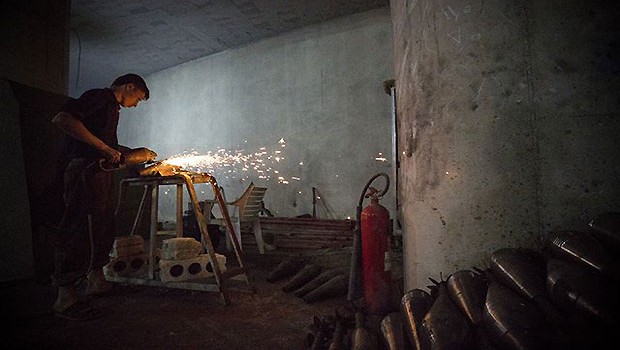From the beginning of the uprising, Syria’s armed opposition hoped that the West would supply them with weapons, or enforce a no-fly zone, or do both. But two years on, the hope has turned to disappointment, disillusionment and anger. And now, tired of waiting for weapons to be shipped in from the outside, the rebels have begun to manufacture them themselves.
Afesh took me to his munitions workshop in a secret location in the Aleppo countryside to see the homemade weapons that he hopes will start turning the battles for Aleppo Province to his favor. To date, the Kalashnikov assault rifle has been the rebels’ signature accessory in this war: I have seen Romanian, Iraqi and Albanian models, some of them older than my parents, slung over the shoulders of opposition fighters. They have rocket-propelled grenades, too, and countless DShK (sometimes called “Dushka”) machine guns mounted on the backs of pickup trucks. But these weapons cannot push back the Syrian Army, which is furnished with Russian-made tanks and fighter jets and flanked by well-equipped fighters from Hezbollah and Iran’s Revolutionary Guard. Afesh tells me that government forces have just started using a new type of tank that is impossible to destroy with the weapons he has available, and that Kalashnikovs are now so precious that they are changing hands for around a thousand dollars each. He says that he has been left with no other choice but to manufacture his own weapons in this makeshift workshop.
Aleppo is the ideal place to start this cottage industry, because before the uprising it was Syria’s manufacturing heartland. There were around 2,000 factories in the city’s industrial district, and all of them were left abandoned as the fighting started. If their owners hope to find their property still intact when they eventually return to Syria, they will be disappointed: the factories have been looted and stripped of anything of value, and some of that machinery has ended up in Ahmed Afesh’s workshop. Cutting machines are being employed to reduce scaffolding poles to the right size to form rocket bodies; welders are shaping the tips. In one corner, a rebel is cooking up explosives in a kitchen that is straight from the Anarchist’s Cookbook.
Afesh is proud of his production line. He holds up one of his homemade grenades in one hand and a Russian-made one in the other. “Mine are five times as powerful!” he exclaims with a broad smile.
But back in his office, he admits that the rebels still cannot win this war without the kind of heavy weaponry that only outside benefactors can provide. “I have four thousand men but they have only light weapons,” he says. “We need smart, modern weapons to finish the regime.”
And where will these weapons come from, if not from the Western powers? Afesh tells me that he refuses to accept funding from the outside donors, such as the Muslim Brotherhood or Gulf-based financiers that are already supporting the opposition, because he believes that to do so would compromise the independence of his brigade. Yet at the same time, he is spending around a million Syrian pounds a day on food and equipment for his troops. He tells me that he also gives SYP 20,000 a month to the families of each of the six hundred men of his brigade who have been killed. Before the revolution, Afesh was a property developer and a rich man. But how long can he carry on bankrolling his brigade in order to maintain its independence, while others with more extremist ideologies and political ambitions receive hefty funding from outside?
Afesh insists that the West should identify the best rebel brigades and arm them, but this is unpalatable for the American and European governments if the Syrian opposition remains in its current state of chaos. He himself admits that cash-strapped rebel brigades will often sell the weapons they capture from the regime to other opposition groups; the flow of weapons from one group to another is uncontrollably fluid.
And yet if the West continues to sit on its hands, it will be the most extreme groups—the ones they are most afraid of—who will continue to flourish, because they have the most money, the best trained fighters, and, increasingly, a groundswell of support from Syrians who are angry that nobody, bar the jihadists, has come to help them. And the stronger those groups become, the less inclined the West will be to intervene. For both Syria and the outside world, it is the worst kind of Catch-22.


Trackbacks/Pingbacks